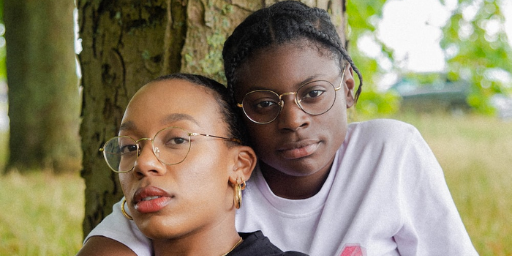“A Week in the Life” is a weekly Zikoko series that explores the working-class struggles of Nigerians. It captures the very spirit of what it means to hustle in Nigeria and puts you in the shoes of the subject for a week.
What’s it like to be a skincare formulator in Nigeria today? For Happylyte, it means producing carefully crafted products made with love, yet fighting logistics drivers and dealing with dishonest suppliers every day. But she’s taking her struggles in stride because her eyes are on the prize — to become a medical aesthetician someday.
MONDAY
I work from home, so I don’t have to rush anywhere.
But I prepare for work as if I have to go to a physical office. By 8 a.m., I’m at my desk, replying to inquiries and confirming payments for my products.
Life here in Makurdi is very peaceful. The labour and rent costs are low — my delivery person charges ₦1k or less to take my products around town or to the bus park for interstate deliveries, and my two-bedroom flat which includes my lab, costs just ₦400k per year.
But living in Makurdi is not the best for my business. I’m a one-woman company, and running this business is a lot and can be very monotonous. I used to have staff, but they weren’t producing the quality I needed — it’s hard to find quality technical labour in Makurdi. Luckily, I can make phone calls while I work. I just connect my Airpods and talk to friends and family for hours. I work until night — sometimes, I even sleep at 2 a.m.
TUESDAY
Tuesdays are the same as Mondays. But sometimes, like today, I order raw materials. Depending on which I want, I can order from Japan, India, Korea or Lagos. For oils, herbs and spices, India has the best.
I got my plug from Instagram, from a lady who orders in bulk for vendors because the oils are expensive, and minimum order quantity costs are too large for me to bear alone. I join money with other skincare formulators to place orders. When they arrive in Nigeria, she distributes them to us.
When I want cosmetic powders, I order from China. I used to order from Lagos, but as my business grew, I switched because I get better quality from abroad, and it’s way cheaper when buying in bulk. I get sunscreen from Korea and Japan.
Ordering from Lagos is extreme sports because anybody can scam you at any time. Some of the powders I use to formulate my skincare products are very similar. They’re white and their textures are almost the same. There was one time I got chemicals from Lagos.
I ordered alpha arbutin, which is soluble in water, but the supplier sent kojic dipalmitate, which only dissolves in oil but is much cheaper. The best way to test it before using is to put some in water and determine which one dissolves and which doesn’t. But that day, I was in a hurry, so I added the powder to the mixture, which included water. That’s when things got interesting.
Alpha arbutin doesn’t tolerate heat, so it’s usually the last thing I add when formulating creams. When the powder didn’t dissolve, I realised it was kojic dipalmitate which ruined the whole formula, and I lost over ₦200k. I was wrecked.
What did the vendor do? She told me, “Sorry, ma.”
My delivery guy sha returned to the supplier’s shop, and the woman gave him some almond oil worth ₦16k to compensate me.
Very agbero people, these Lagos suppliers. Sometimes, when I order carrot essential oil, they’ll send me a carrot carrier oil instead. But no be every time person dey fall mugu. I now know what to look out for, so when I see it’s not what I ordered, I return it and make them correct my order and pay the delivery fees. Nonsense!
WEDNESDAY
Every Wednesday, I always tie my belt for drama from bus drivers. I had to refund a customer’s package today. It got lost in transit, and the logistics company was giving me story. Logistics will make you run mad.
One called me and was asking me to describe the place I wanted him to deliver to. How would I know? I’ve never been to Onitsha in my life. I gave you the receiver’s number for a reason for God’s sake.
I’m always tranferring aggression with drivers. When a driver shouts at a customer, the customer calls me and shouts at me. Then I’ll call the driver and shout at them, and on and on it goes.
But that’s not even the worst. In 2020, I had a driver who took my parcel home and gifted it to his wife.
After ignoring my calls for days, this man blocked my number. A week later, his wife called me to ask me how to use the products. When I asked her what and what was in the parcel, and where was her location, she told me, “Gboko.” I checked my records, and I never sent anything to Gboko .
I asked her where she got the products from. She told me it was her husband who bought them for her from Abuja. I asked if her husband drives for Benue Links. She said yes, sometimes. I told her, “Your husband is a thief ma. He stole your parcel.” She also cut the call and blocked my number. Like husband, like wife.
Every Wednesday, I always tie my belt for drama from drivers. I’ve been in this business for years, but you can never get used to the rubbish.
THURSDAY
A mistake people make too often is using products because they work for someone else. Just because someone says, “This one works for me,” you now drop the one you were using and run and go and buy that one. The lack of consistency and shifting goalposts every now and then will ruin your skin. Why are you using so many skincare products?
Someone can hear someone say, “Oh my God, this moisturiser was so good for me.” And then you with dry skin that’s supposed to be using a moisturiser that has plenty oil and lots of hydrators — you’ll now leave the one they made for you and go and another person’s own, and then your skin will now be cracking.
I’ve had a situation like that and her skin cracked so bad I had to recommend her to the dermatologist because that one don pass my power. I can make skincare products but I’ve not licensed to treat skin diseases.
FRIDAY
I don’t have a degree in chemistry — I studied economics in uni — but I’ve taken several training cosmetic formulation classes online, from Udemy, Coursera and The Formulator’s Shop. And there’s nothing I love more than listening to dermatologists and cosmetoligists talk on websites like Making Cosmetics, Brambleberry and Soap Queen. Offline, I learnt to make black soap and shea butter from local producers.
I have processes and products that ensure my products are safe. If I want to make body cream, for example, the first thing I do is decide what I want that body cream to do. Do I want it to be a moisturiser? Do I want it to have a brightening effect, etc? The hardest part about formulating skincare and cosmetics is creating — and sticking to — the formula. It involves plenty maths and accuracy. I have to determine the types of active formulas I want to use, their percentages and how they can work with each other instead of against each other.
Before packaging, I stabilise my creams at a pH safe for the skin (4-5 – 5.5). For soaps, they need to be more basic (7.5 – 9) because if soaps are too acidic, they’ll not foam.
I keep my products for at least a month. During this time, every week, I check for the smell, whether there’s mould growing on it and also check for consistency, making sure they’re exactly the same as the first day I made them. After that first phase of testing, I try the products on myself.
I have a very sensitive skin, so if it’s a bad product, my skin reacts immediately and I dump it. If it’s a good product, my skin would accept it, then I start sending them out in batches. My close family and friends usually try my products for me before I launch them too.
Sometimes I go to the inbox of customers and I say, “Oh, I have a product I’m trying out. Would you like to help me test it out?” When they do — because nobody says no to free products — they give me their honest review, then I make amendments before releasing them to the market. My formulation process usually takes about three months.
I don’t let anyone into my lab, not even my mother. I don’t even open the windows in that place. Because if something funny blows in, it can touch something it’s not supposed to touch. I control the temperature with a fan and then the AC from my sitting room filters into the lab.
I also label all my ingredients on the products so people know what they’re putting on their skin. I don’t claim to be an organic skincare maker because some of these people just mix a bunch of stuff they’re not really sure about.
SATURDAY
After such a challenging week, today went great. I didn’t have any problems with delivery or with customers.
Asides from the occasional difficult customer, my customers are great. I’ve managed to build myself into a brand that people trust and I’m grateful.
When I go to bed tonight, I’ll dream of the future. I’m trying to be a medical aesthetician. I want to be trained and certified to give chemical peels. When I started becoming interested in skincare, I never know it’d turn to a business. I was just doing it because I liked local soaps and creams.
But if I become a medical aesthetician, I will be cetified to administer things like chemical peels which require special training. In the next three years, I hope to take SIDESCO and CIBTEC exams and take my career to the next level.
I’m smiling as I’m thinking about my dreams and logging into Netflix. Thank God for the weekend.
If you liked this story, also read: The Doctor Who Ditched Clinical Practice to Sell Perfumes — A Week in the Life
Check back for new A Week in the Life stories every first Tuesday of the month at 9 a.m. If you’d like to be featured on the series, or you know anyone interesting who fits the profile, fill out this form.




